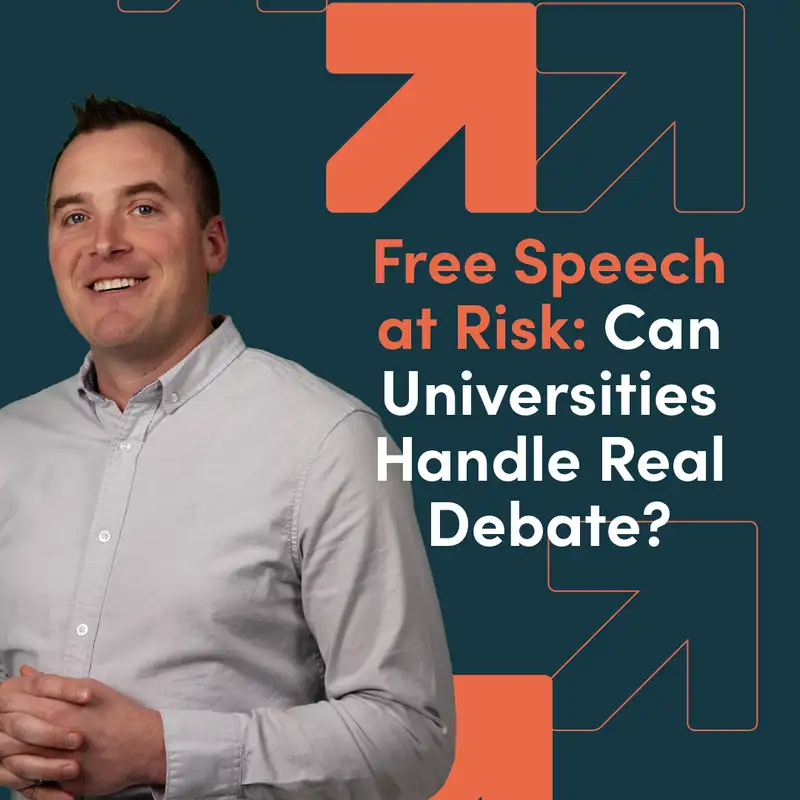Free Speech at Risk: Can Universities Handle Real Debate?
Hello, everyone. Thanks for listening to Wake Up, Look Up, a podcast where we connect events happening in real time to the gospel of Jesus Christ. I'm Zach Weihrauch. And in today's episode, we're looking at whether or not free speech is at risk in our country, and we're asking the question, can universities handle real debate? This is based on a New York Times article about the growing divide between the Trump administration and Ivy League institutions like Harvard over something called viewpoint diversity.
Now viewpoint diversity is a term that means, in fostering an environment where multiple perspectives are allowed to be presented. The Trump administration believes that increasingly, American universities are becoming monolithic in their viewpoints, that overwhelmingly, they're presenting highly liberal positions and really through their policies getting rid of or even delegitimizing and even sometimes punishing any viewpoint that is in opposition. As a result, the administration is cutting funding to universities until they can show progress in viewpoint diversity, that they're a safe environment for contrarian positions or even just conservative positions. The pushback on the university side is that viewpoint diversity in theory is good. I think universities acknowledge they would like to do a better job of making sure every kind of student is able to present legitimate and reasonable viewpoints.
Of course, the nature of the disagreement is over what's legitimate. In other words, Harvard might say, if you want to have an event on campus where you deny that the holocaust happened, is that viewpoint diversity or is that hate speech? And who decides the difference? And now what used to be a conversation about speech is a conversation about politics, a conversation about freedom, and a conversation about hate. And there's a little bit of a standoff happening right now between the White House and, universities.
So how should we think about this as Christians? Should we be pro viewpoint diversity, or, should we be worried about hate speech coming under the that umbrella? Well, the answer, I think, is a little bit of both. The Bible is very pro conversation, pro worldview collision. I mean, when God made the world in the book of Genesis, he makes the world knowing it will result in diversity.
The Bible is to always talking about God being a light to the nations. See Psalm 67. But the nations never lose their cultural perspective or identity. I mean, every culture has good things and bad things, ways it agrees with God and ways that it is wrong, but every culture also has different value systems that are not in the right and wrong category but in the cultural reflection category. Reflection category.
And the Bible never seeks to quiet those or diminish those, but rather bring them all under the umbrella of God's authority. One of the off quote quoted verses in the Bible is Proverbs twenty seven seventeen, which says iron sharpens iron. As iron sharpens iron, one brother sharpens another. That that goes again to the idea that colliding perspectives, challenge, disagreement, debate, argument can actually produce stronger people, stronger society, stronger ideas. And we all have to heed the words of Paul in Romans twelve three when he says that we ought not think of ourselves more highly than we should.
Viewpoint diversity is a check against the pride of me knowing and thinking all the time that I am right. If I live in an echo chamber, how will I ever know when I am wrong? So for those reasons, I think the Bible would be pro viewpoint diversity. That doesn't mean the Bible says every view is right or moral or just or agrees with God, but rather that when ideas collide, truth always ultimately wins. But this argument is actually pointing to a greater spiritual problem.
All of us would say free speech in theory is a good thing. People should not be punished for what they have to say. All of us would say that active political and social debate probably leads to a greater society in theory. The problem, of course, is that when you play sports without a referee, the rules get blurry. And when we talk about academic and intellectual debate, what we are longing for, whether we realize it or not, is a larger perspective, a louder voice, a true authority who helps us in the midst of that debate navigate what is really true and what isn't.
And, of course, that larger authority is God himself. In John three and John four, Jesus models for us what it looks like to engage other worldviews, whether it's Nicodemus or the woman at the well. And we need that model because he does it free of sin. You and I do not. Of course, Proverbs three says, don't lean on your own understanding, but trust in the Lord.
It's a reminder that when we debate one another, we ultimately need to look to God's wisdom. So should we engage in ideas? Yes. Should we debate? Yes.
Should everyone's perspective be heard? Yes. But then, ultimately, we've gotta turn to the wisdom of God to tell us what is actually true. Free speech without a rooting in absolute truth does lead to chaos, and that's what's happening right now in our country. Hey, thanks for watching this episode of Wake Up, Look Up.
If you enjoyed it, please help us get the word out by sharing it with someone you think might benefit from it. And while you're here, make sure to subscribe to our YouTube channel to get further content or even download the CCC app where you'll find even more resources to help you grow in your faith and relationship with Jesus Christ.
Have an article you’d like Zach to discuss? Email us at wakeup@ccchapel.com!
Creators and Guests


